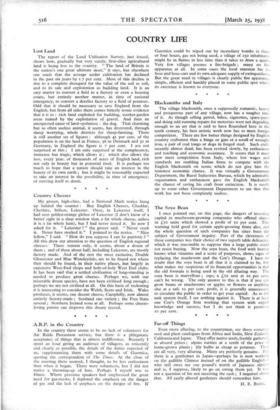Blacksmiths and Italy
The village blacksmith, once a supposedly romantic, hearty and prosperous part of any village, now has a tougher time of it. As though selling petrol, bikes, cigarettes, spare-parts and doing odd running repairs for motorists were not degrading enough to an art that is said to have flourished here in the tenth century, his best artistic work now has to meet foreign competition. There are few better things designed by English country craftsmen than a hinge or gate or a scroll of wrought iron, a pair of coal tongs or dogs in forged steel. Such craft, recently almost dead, has been revived slowly, by enthusiasm and teaching and economic assistance. It seems that it must now meet competition from Italy, where low wages and standards are enabling Italian firms to compete with the English blacksmith on terms which do not give him the remotest economic chance. It was virtually a Government Department, the Rural Industries Bureau, which by admirable organisation and enthusiasm gave the English blacksmith the chance of saving his craft from extinction. It is surely up to some other Government Department to see that that work has not been completely useless.










































































 Previous page
Previous page